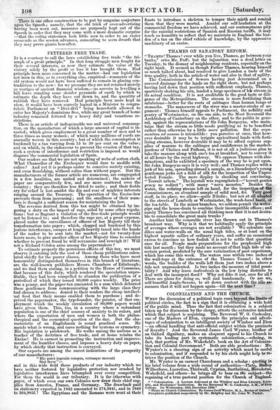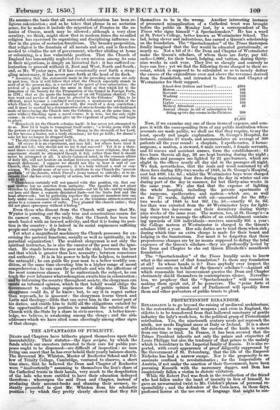COLONIZATION AND THE CHURCH.
WHEN the discussion of a political topic runs beyond the limits of political circles, the fact is a sign that it is obtaining a wide hold of the public mind. Thus the fact that colonization is a subject taken up for discussion by the clergy, attests the extensive interest which that subject is acquiring. The Reverend W. G. Cookesley, one of the Masters of Eton, expounds the principles and advan- tages of colonization to an intelligent society of Windsor and Eton —an official handling that anti-official subject within the precincts of Royalty ! And the Reverend James Cecil Wynter, brother of an Oxford dignitary, makes an eloquent appeal to his Church to take its leading part in systematic colonization,—echoing, in fact, that portion of Mr. Wakefield's book on the Art of Coloniza- tion and Colonial Government.* Both are able .productions : Mr. Wynter's is a cheering sign of an activity which must be useful to colonization, and if responded to by his cloth might help to re- trieve the position of the Church.
Mr. Wynter is an earnest Churchman and a scholar : quoting in his brief volume from a wide round of authorities—Plato, Bishop Wilberforce, Lucretius, Thirlwall, Cyprian, Biuthelemi, Herodotus, Wakefield, and others—he brings all to bear on the subject—the regaining of a true pastoral position for the Church of England.
• "Colonization. A Lecture delivered at the Windsor and Eton Literary, Scien- tific, and Mechanics' Institution. By the Reverend W. G. Cookesley, A.M., of Eton College. On Wednesday, 19th December 1849." " Hints on Church Colonization. By James Cecil Wynter, M.A., Rector of Gauen." Pamphlets published respectively by Mr. Ridgway and Mr. John W. Parker. He assumes the basis that all successful colonization has been re- ligious colonization; and as he takes that phrase in no sectarian sense, for he makes it include the migration of Penates in the co- lonies of Greece, much may be allowed; although a very close scrutiny, we think, might show that in modern times the so-called religion has exercised its organizing and disciplining influence ra- ther in the guise of sectarian fanaticism. The broader proposition, that religion is the fountain. of all morals and art, and is therefore needed to vitalize the art of government, whether abiding at home or colonizing, is a less vulnerable position. That the Church of England has lamentably. neglected its own mission among its sons in their migrations, is simply an historical fact : it has suffered co- lonization to proceed without it, East and West, North and South; and, as Mr. Wynter says, if it has occasionally sent forth a strug- gling missionary, it has never gone forth at the head of its flock.
" Assumin& that the statements made in the preceding sections are only in part true, 'then it will follow that what the Church especially stands in
need of at the present day, is a revival of the sphit of true colonization; the revival of a spirit somewhat the same in kind as that which led to the formation of the Society for the Propagation of the Gospel in Foreign Parts, in 1701; that so (to quote the language of an old V. • charter) 'the true word and service of God may be planted in the Colonies.' This, to be efficient, must beeome a combined movement, a spontaneous action of the whole Church, the expression of its will, the result of a deep conviction ;
and it must be marked by a determination at once to forsake the old-fashioned mode of introducing the Church into the Colonies, and, at the same time, to
enter without flinching upon a novel course, it is true, but the only right course : in other words, we must give up the expedient of grafting and begin to plant. "Henceforth let the Church colonize itself: it has never yet attempted to do so. Now let it begin to transplant itself entire ; a living germ with all the 'powers of reproduction in herself.' Strong in the strength of her Lord, let her become a leader, not a tardy attendant; kt her go forth; for shame's sake let her no longer be dragged forth. "The objection to this proposal will be, that it is an experiment, and may fail. Of course it is an experiment, and may fail ; but others have tried it and did not fail; why, should not we try it and succeed ? Yet it is a thou- sand times more comely, wise, ay, a thousand times more religious, that the experiment should be attempted though it fail, rather than that it should never be attempted at all. A nicely-balanced mind, in the common affairs of daily life, will not hesitate an instant between contingent failure and per-
manent clishonour. I suppose we should not like to hear it said of our Church, that, like all bodies corporate, it is a body without a soul or con- science, We should none of us care to attribute to our Church the pouvoir prochain ' of the Jesuits, which Pascal's irony turned to ridicule ; or to in- sinuate that she has every capacity of action, but neither the ability nor the will to act.
"Churchmen certainly will not quarrel with this position viz, that our past system has no sanction from antiquity. The Apostles' did not plant churches by driblets, fragments, instalments—not bit by bit—not by sending out here and there a separate disjointed limb—not the limbs first and the head afterwards; but by gathering together the separate members into one
body under one common visible head, just as the loadstone attracts scattered atoms to a common centre of unity. They planted the church entire ; they did not plant episcopacy without 'S bishop.'
Even those who dissent from the Church will agree that Mr. Wynter is pointing out the only true and conscientious course for its earnest sons. He says truly, that the Church has been too much busied with an inward activity., and that it is losing its posi- tion in the country: it is indeed in its social supineness suffering people and empire to slip from it. Yet what a magnificent machinery the Church possesses for ex- ercising the pastoral functions, socially as well as spiritually, in its parochial organization ! The resident clergyman is not only the spiritual instructor, he is also the curator of the poor and the igno- rant He stands between the poor and the rich; between the law and that which is greater than law, necessity; between conscience and authority. It is in his power "t,o help the helpless, to instruct the untaught he can guide the poor man to a better worldly con- dition at the same time elevating him to a higher range of moral comprehension; he can earn the gratitude and win the affections of the most numerous classes. If he understands the subject, he can teach the poor labourer whatredemption awaits him in colonization; andly informing the country throughout society, the clergyman can create an informed o simon, which in that behalf would Oblige the Government to exc e supineness for diligence. This the clergyman could do, if s e knew; but, to say it in regret rather than reproach, he is ignorant : the clergyman learns Greek and Latin and theology—little that can serve him in the social part of his duties and enable him to fulfil all the obligations entailed by the opportunities of his position to maintain the relation of the Church with the State by a share in civic services. Abetter know- ledge we believe, is awakening among the clergy; and the able addresses which we have cited come cheeringly among other signs of that change.



























 Previous page
Previous page